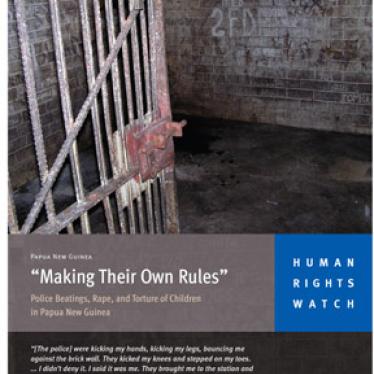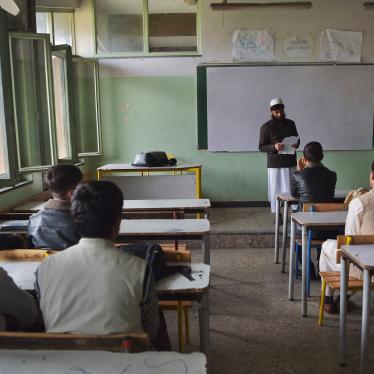(Port Moresby) - The Papua New Guinea government must act to stop the police from engaging in brutal beatings, rape and torture of arrestees, many of who are children, Human Rights Watch said in a new report released today.
The 124-page report, “Making Their Own Rules’: Police Beatings, Rape, and Torture of Children in Papua New Guinea,” documents boys and girls being shot, knifed, kicked and beaten by gun butts, iron bars, wooden batons, fists, rubber hoses and chairs. Some are forced to chew and swallow condoms. Eyewitnesses describe gang rapes in police stations, vehicles, barracks and other locations. Children are also routinely detained with adults in sordid police lockups and denied medical care.
“Extreme physical violence is business as usual for the Papua New Guinea police,” said Zama Coursen-Neff, senior researcher for Human Rights Watch’s Children’s Rights Division. “Instead of protecting the public and children from violence, it is the police who are committing some of the most heinous acts of violence imaginable.”
Australia is Papua New Guinea’s largest foreign donor, and Papua New Guinea is its largest per capita recipient of Australian development aid. Much of this aid is directed to the police force, yet Australia does not make promotion of human rights an explicit purpose or condition of its aid. Australian officials admit that aid to the police has failed to reduce violence and other human rights violations by officers.
“Australia’s expanded engagement with the Papua New Guinea police is an opportunity to better address accountability for police who beat, rape and torture children,” said Coursen-Neff. “Australia should not let other issues overshadow concern for the human rights of children in Papua New Guinea.”
Children make up nearly half of Papua New Guinea’s some 5.6 million people. Fewer than half of all school-age children are enrolled in school, and those who leave school are unlikely to find paid employment. Although all children may be subjected to police violence, children perceived as gang members (“raskols”), street vendors, child sex workers and boys engaged in homosexual conduct are especially targeted.
Human Rights Watch said that police abuses, such as police rape, targeting of sex workers and men and boys engaged in homosexual conduct, and harassment of people carrying condoms, may also fuel Papua New Guinea’s burgeoning AIDS epidemic. These acts may spread the disease, deter people from carrying condoms, and drive marginalized populations underground and away from potentially lifesaving information on HIV prevention and health services. Experts believe that at least 80,000 people are living with HIV in Papua New Guinea—including 3 to 4 percent of adults in the capital—the highest rates in the region.
“Human rights abuses by the police are undermining desperately-needed HIV/AIDS prevention measures by the government, civil society and international donors,” said Coursen-Neff.
In addition to being abusive, Human Rights Watch said that police violence is ineffective in the face of the country's serious crime problem. Violent police tactics make people fearful of approaching police even to report crime and reluctant to cooperate with investigations. Even government studies have found police increasingly unable to fight crime.
One positive development has been the recent establishment by the Papua New Guinea government of juvenile courts and guidelines for police, magistrates and others designed to divert children from detention.
“The new juvenile courts and juvenile justice guidelines are critical steps in the right direction, but they have to be taken from paper to practice,” said Coursen-Neff. “Yet rampant police violence against children threatens to undermine these commendable developments.”
The police have been unwilling or unable to discipline their own members. With little or no penalty for violators and few incentives for good practices, police training has had little effect on abusive police tactics. “There is no more important government responsibility than protecting children and other vulnerable people from violence,” said Coursen-Neff. “If the government is serious about the protection of children, it must start holding accountable police who beat, rape and torture children.”
Human Rights Watch called on the Papua New Guinea government to:
• publicly repudiate police violence,
• to dismiss and prosecute perpetrators, and
• to designate an independent body to monitor police violence against children.
Human Rights Watch also called on Australia and other international donors to place more emphasis on accountability for officers and their commanders who commit crimes, to encourage independent monitoring of police by a body outside the force with the resources and mandate to do the job, and to assist the development of local human rights groups with the capacity to demand accountability from the government and monitor police violence.






